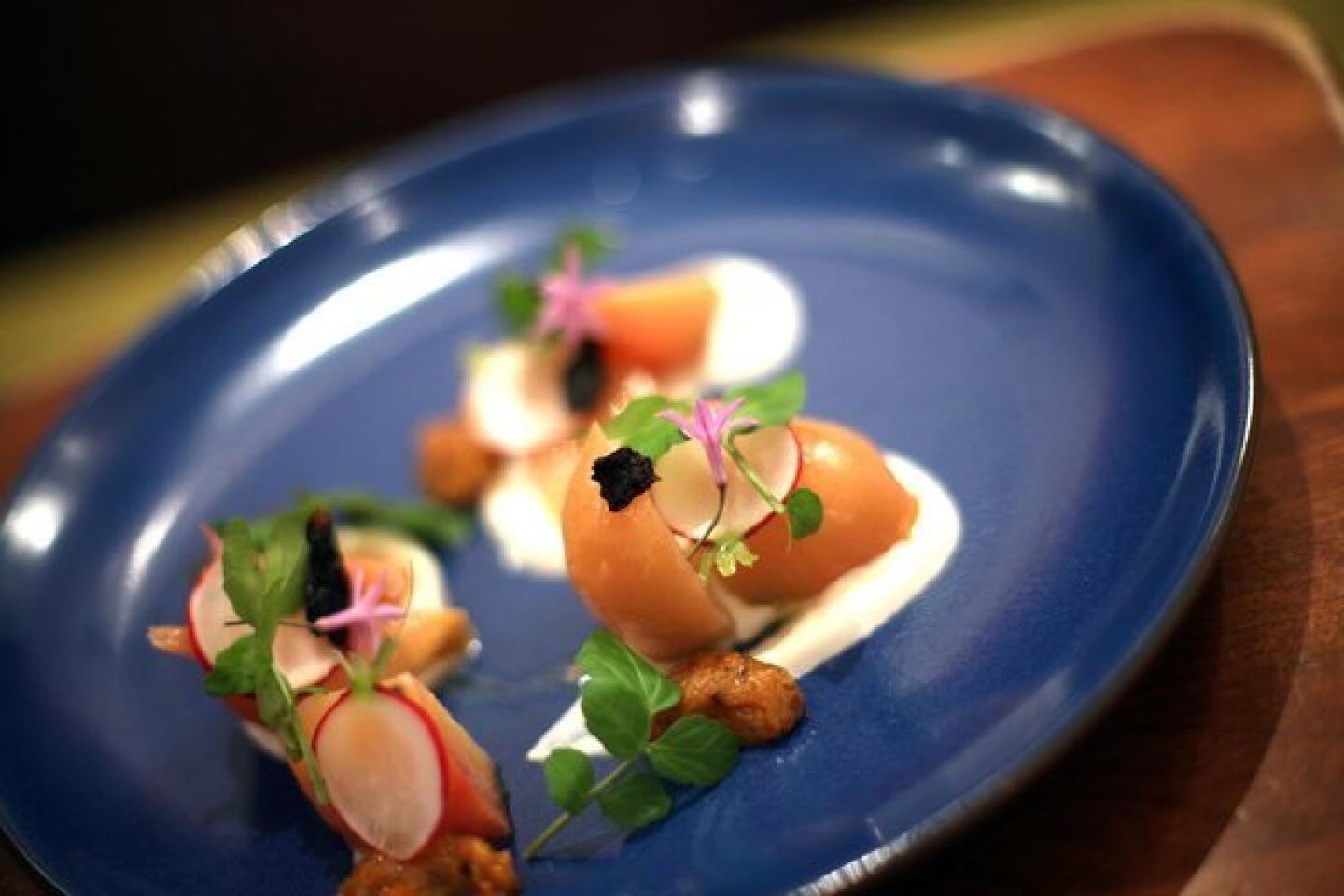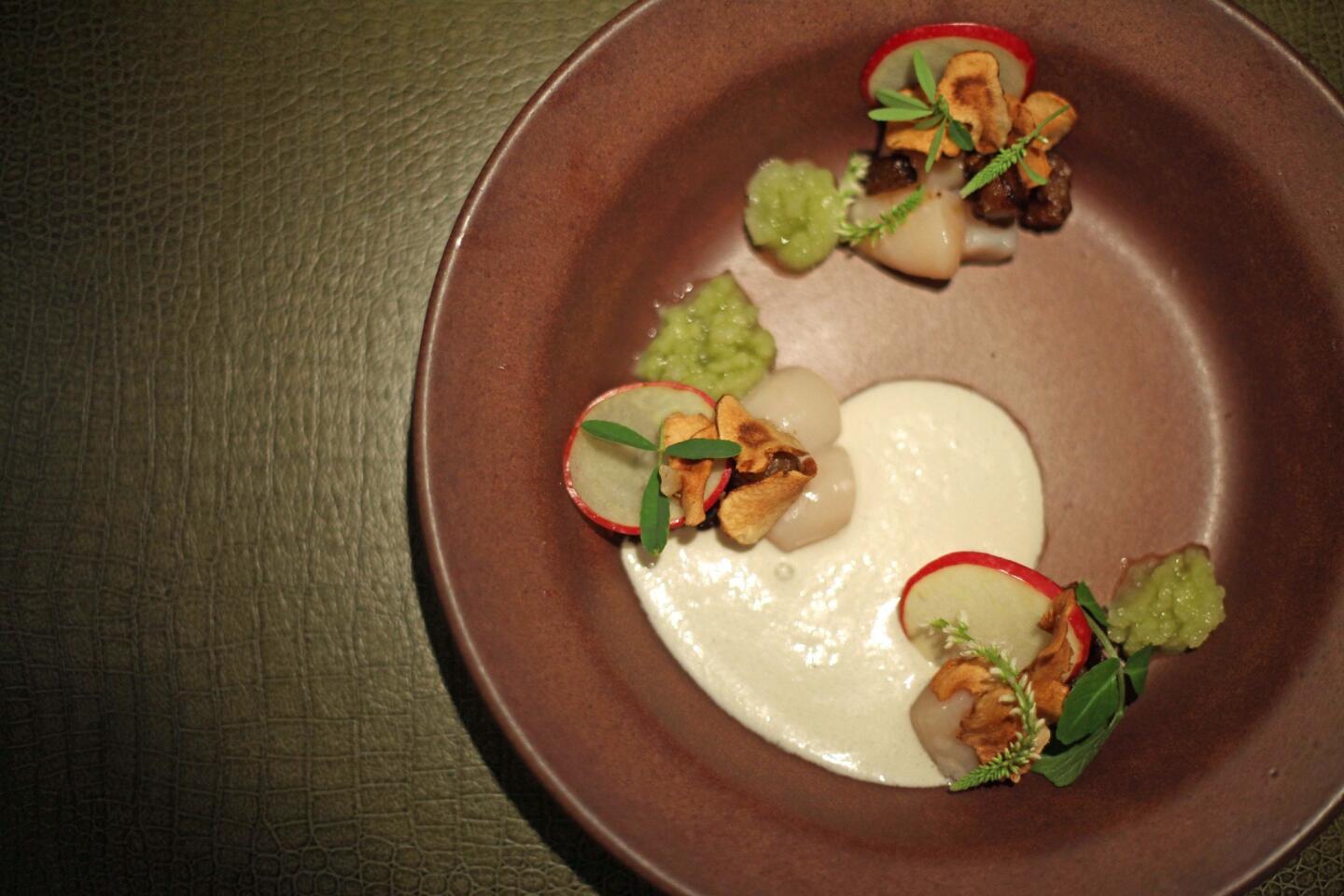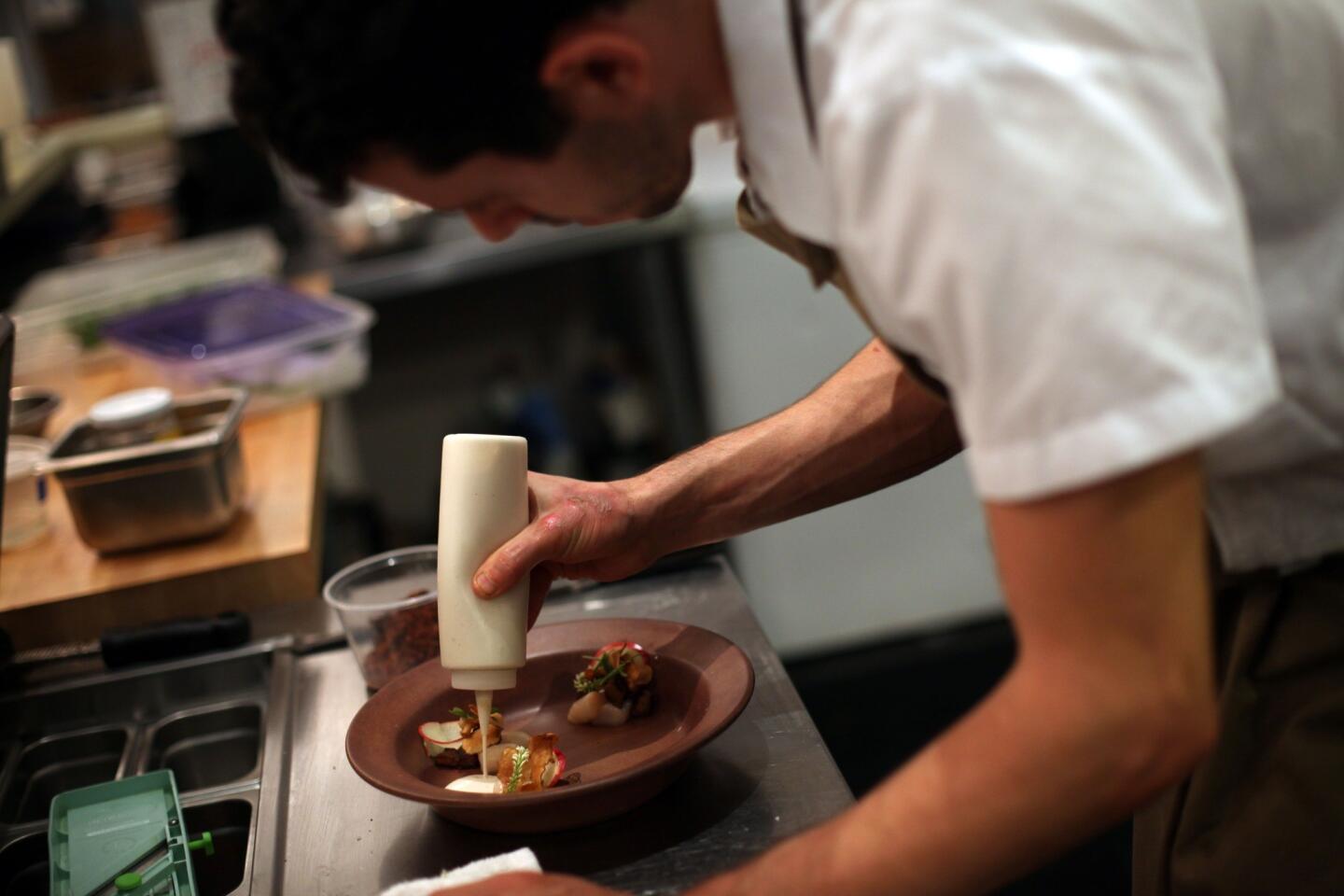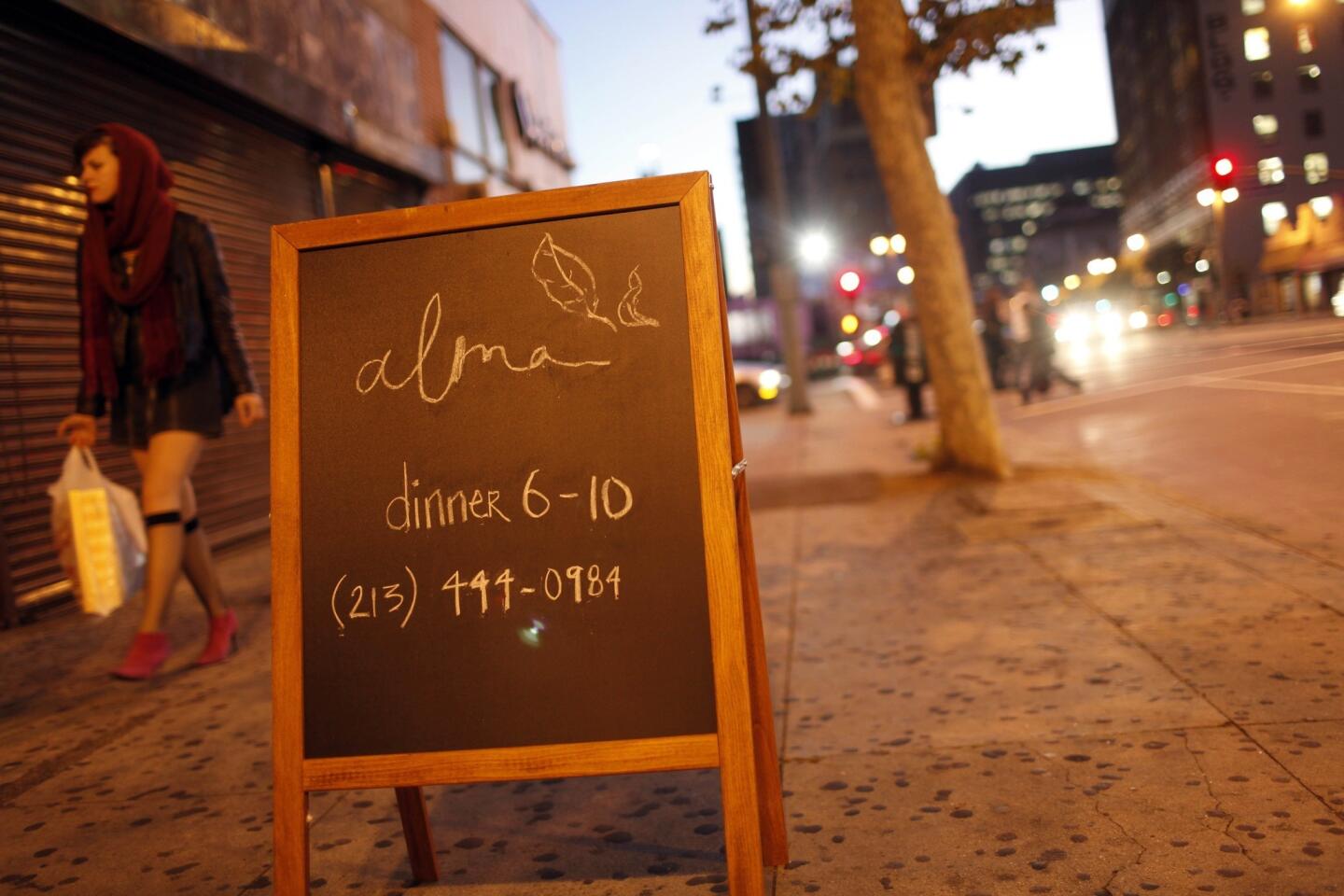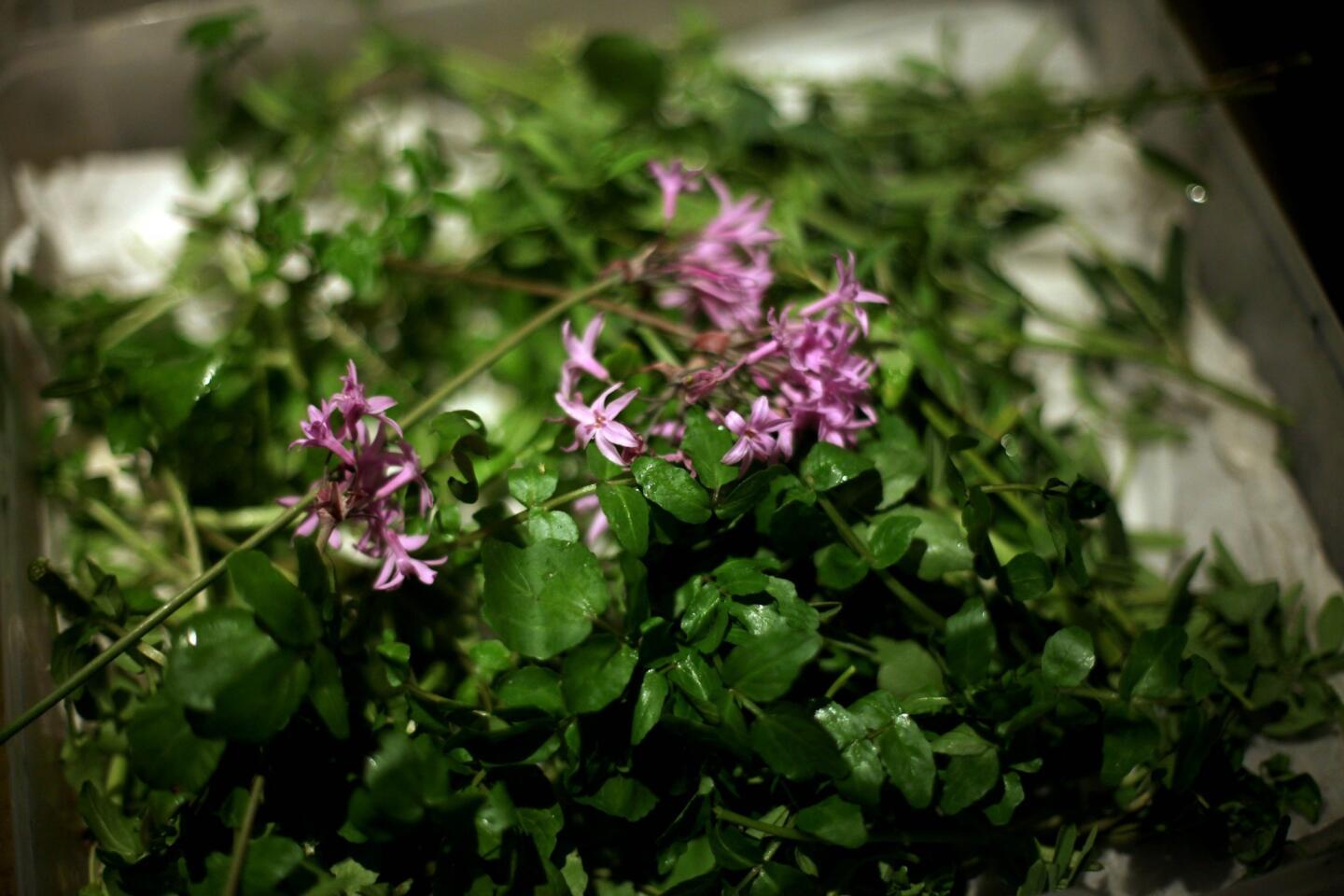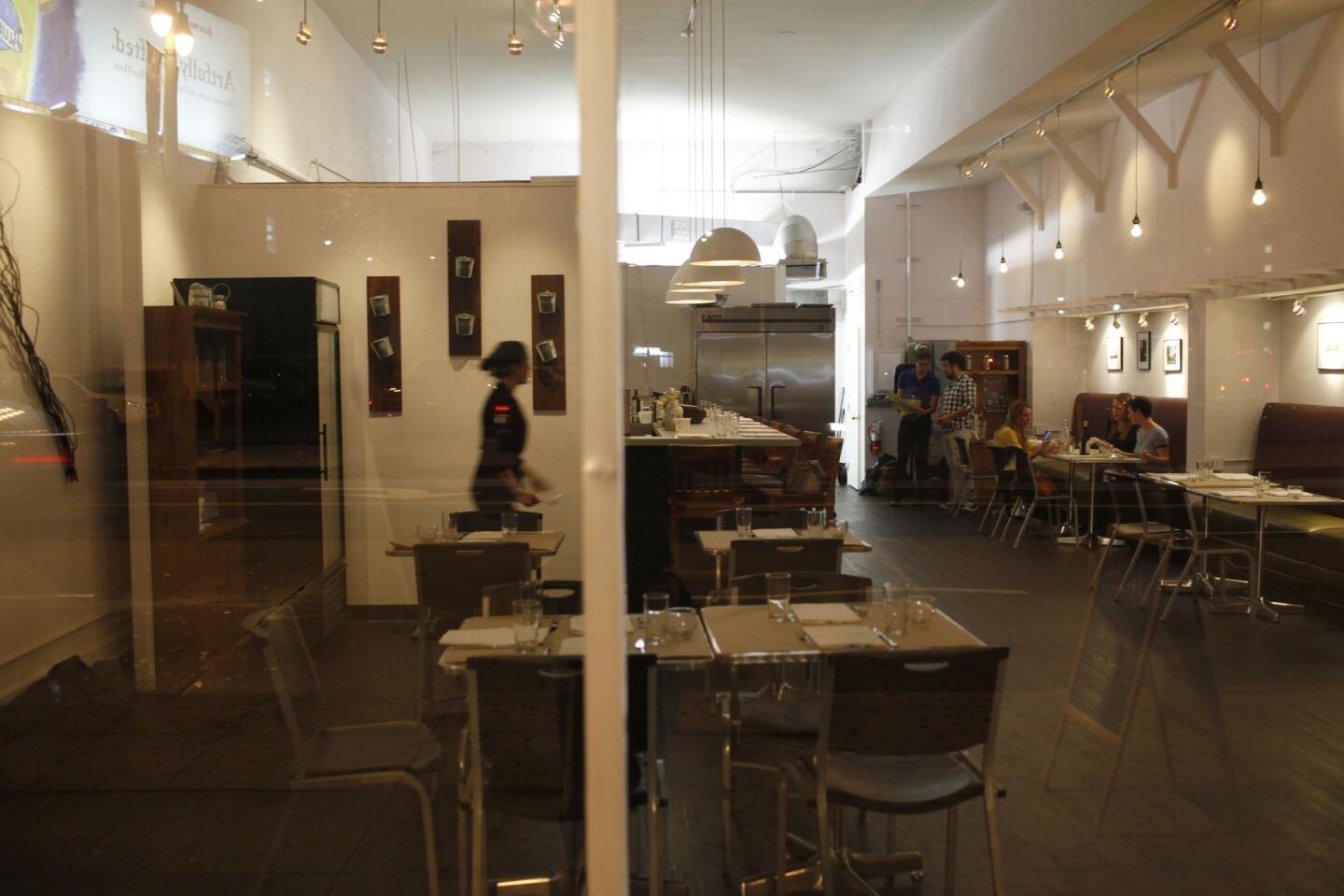Counter Intelligence: Ari Taymor’s Alma stands apart in L.A.
- Share via
If you had asked an observer a few years ago whether the future of dining in Los Angeles was more likely to be influenced by its mobile restaurants or its pop-ups, the money would have been on the trucks. Food trucks seemed to draw from everything about L.A. in 2010 — mobility, multiculturalism, social-media compulsion and the ceaseless drive toward novelty. The food truck culture rewards the short attention span. It rewards it with kimchi cheesesteaks.
But while the Kogi empire is still expanding, this may have been the year when restaurants born as pop-ups began to assert themselves. A pop-up — a restaurant temporarily operating within an existing restaurant — is a modest way for a young chef to build a following, try out new dishes and discover his or her style without the rigors of raising capital, negotiating with property barons or designing kitchens. It can be a reasonable way to begin a career.
Jonathan Gold Quiz: HamburgersFood trucks, on the other hand, tend not to scale well, and the limitations of road cooking, like those of the great-looking skateboarder you met at Coachella, become pretty apparent when transplanted into the confines of an actual building. A successful food truck doesn’t become a restaurant. It becomes three successful food trucks.
Pop-up chefs often turn out to be restaurant chefs. The mozzarella nights that Nancy Silverton brought to Jar and La Terza work just fine as a permanent fixture at Mozza. Mission Chinese, conceived as a maverick pop-up within a run-of-the-mill San Francisco Chinese restaurant, has become the most-talked-about new restaurant in New York.
This brings us to Ari Taymor, a young chef who cooked at Flour + Water and other well-regarded Bay Area restaurants before he moved south. Alma, his new downtown restaurant, began as many months of pop-ups in Los Angeles, and Taymor’s unassuming modernist cooking fit into underused spaces like a hermit crab into its shell.
When it slipped into its permanent space a few months ago, in a barely marked storefront next door to a taxi-dance parlor on South Broadway, it still felt like a pop-up. The most memorable bit of décor in the restaurant was a Chez Panisse poster displayed under cracked glass. The restaurant was refinished, and there are now sleek fixtures, blond-wood veneers and upholstered benches comfortable enough to lounge on for hours, but it will not be mistaken for Spago anytime soon.
A meal at Alma is likely to begin with seaweed and tofu beignets. The beignets superficially resemble the green tofu balls at Starry Kitchen, but the taste is closer to that of the hair-seaweed yellowfish fritters you see in Shanghainese restaurants. They are set on dabs of citrusy mayonnaise, and they are dabbed with a bit of yuzu kosho, a tart, fragrant paste of chile and Japanese yuzu zest.
You might see a spare salad, shreds of radicchio and curly endive interspersed with foraged chickweed, dock and oxalis, dressed with horseradish and a little crème fraîche, sprinkled with tiny bits of nuts and seeds. You are not quite sure what any one bite you are eating might be, but it tastes gloriously, of early California fall. Bowls of crisped sprouting broccoli, crunchy as any kale chips, hide spoonfuls of aioli reddened with Basque pepper. Slices of toasted baguette, smeared with puréed dates, are served with a smooth, cool mound of rabbit-liver mousse, rich as foie gras.
Alma is without an alcohol license at the moment, although one is pending, so the kitchen concocts its own, barely sweetened soda pops to match the cuisine — one with fresh ginger, a vanilla-black lime pop that reproduces most of the sensations of a California Chardonnay, and something called Red 40, flavored with beets. The food is pretty hard to pair with wine at any rate — of all the alcohol I’ve brought into Alma, the most successful was probably a super-funky bottle of natural Basque cider. When you ask about what to drink at the wine shop around the corner, the proprietor only shrugs.
You never quite know what you’re going to find at the restaurant, where the menu changes almost every night. One evening there might be a soup
of miso and puréed celery root, striking a teetering balance between earthiness and umami, spiked with a few cubes of pickled pear; the next, a mild purée of parsnip and poached black garlic sweetened with apple; or vegetables in a puddle of dashi, enhanced by what you later find out is not tofu but whipped ox marrow.
If you spot something ordinary like lamb, it will have been braised with super-salty clams and served on a bed of braised sunflower seeds swirled on the plate in a way that makes them look like a school of sardines. (Could the seeds really be all pointing in the same direction, or is that a visual trick?) You will all but ignore the crackly skinned roast chicken when you come across the sweet, shriveled, butter-soaked carrots on the plate. (Those carrots are often served as a main course too, and you don’t have to be a vegetarian to think that they are the best things at the restaurant.)
You may have seen dishes like this at Manresa or Coi in the Bay Area, but nobody is cooking quite like this in L.A. at the moment. This is a modest but sure step toward the cuisine most often seen in restaurants with six-month waiting lists and $145 tasting menus.
Taymor and his cooks work behind a diner counter, gliding between the cold station and the stove, stopping occasionally by the immersion circulator, the Pacojet, and the high-tech blender; breaking up trayfuls of cake into ragged shards; and measuring out purées by the spoonful. Taymor works with a forager, so your plates are likely to include three different kinds of sweet clover instead of basil or thyme.
I once asked him about a clump of vivid, translucent fruit garnishing a scallop, and he told me they were nightshade berries.
“Don’t worry,” he said. “The leaves would make you pretty sick. But the berries? The berries are fine.”
Alma
Talented young chef Ari Taymor is making the transition from pop-up to real restaurant. This could be the start of something big.
LOCATION
952 S. Broadway, Los Angeles, (213) 444-0984, alma-la.com.
PRICES
Snacks, $5-$6; starters, $9-$13; main courses $15-$25; desserts, $9. Tuesday prix fixe menu, $45.
DETAILS
Dinner Tues.-Sat., 6 p.m. to 10:30 p.m. AE, MC, V accepted. BYOB. Lot parking just north of restaurant. Vegetarian options available.
More to Read
Eat your way across L.A.
Get our weekly Tasting Notes newsletter for reviews, news and more.
You may occasionally receive promotional content from the Los Angeles Times.
